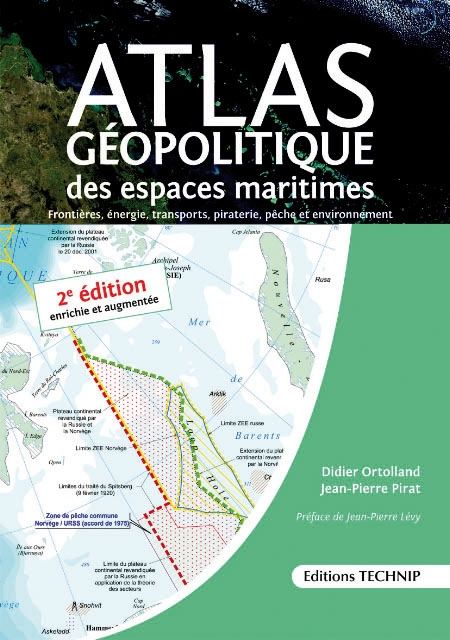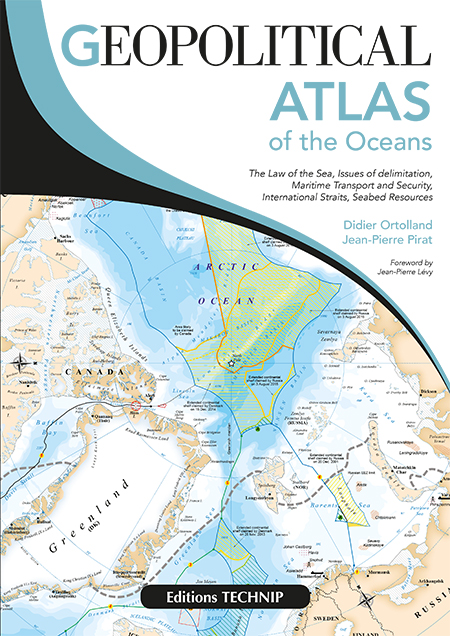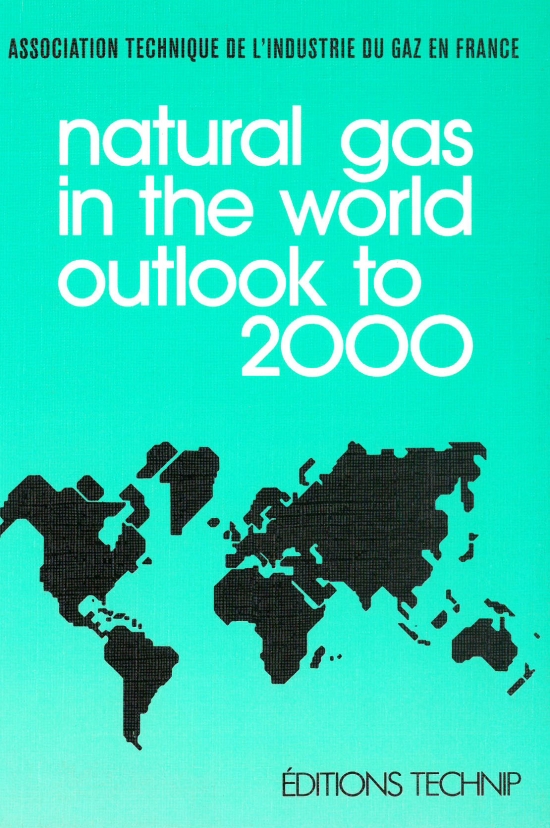Geopolitical Atlas of the Oceans
The Law of the Sea, Issues of Delimitation, Maritime Transport and Security, International Straits, Seabed Resources
Auteurs : ORTOLLAND Didier , PIRAT Jean-Pierre
Commentaire :
The first French Edition of this book was awarded
a prize by the Société de Géographie in 2009.
with 120 maps and schemes
ISBN : 9782710811640
broché 210 x 297 mm 352 pages
Date de publication : Octobre 2017
 Ajouter au panier 180 €
Ajouter au panier 180 €
While not providing an answer to all maritime problems, the 1982 Convention on the Law of the Sea has successfully solved a number of issues relating to the exercise by States of their sovereignty and jurisdiction over ocean space and its resources.
Among its major achievements are the adoption of clear limits of jurisdiction of coastal States over ocean areas and their concomitant rules of navigation; basic guidelines for the use of ocean resources and the creation of institutions, in particular for the exploitation of deep seabed resources and the peaceful settlement of disputes.
After centuries of divergent practices, all coastal States have agreed to adopt a uniform limit for their territorial sea at 12 nautical miles. As a result, more than 100 straits used for international navigation have fallen under national sovereignty, thus leading to the adoption of a new regime of transit passage. Beyond the territorial sea, States can establish, whenever possible, an exclusive economic zone to a maximum extent of 200 miles. Such an extension may lead to conflicting claims.
Similarly, the definition of the continental shelf as the natural prolongation of land territory under the sea, either arbitrarily fixed at 200 miles (in the absence of a shelf) or extending up to the limit of the continental margin, has led to a second phase of appropriation of maritime spaces by certain coastal States.
Finally, as far as the deep seabed beyond the limits of national jurisdiction is concerned, its resources will have to be exploited under the control of the International Seabed Authority established in Jamaica.
Within this legal framework, the sea remains more than ever a source of wealth and becomes increasingly an area of conflicts. National geopolitical considerations push States to adopt specific maritime policies generating tensions and conflicts. These are mainly the result of national political and economic ambitions.
Fishery resources are becoming scarce, offshore oil and gas production is still essential for the energy balance of nations and possibilities of deep seabed mineral resource exploitation are getting closer. In addition, at 80% of the international trade volume, maritime transport remains the backbone of globalisation. Besides, seaborne piracy remains a significant issue and the respect for freedom of navigation through international straits is becoming increasingly important.
While some conflicting claims become more acute, some apparently frozen maritime disputes remain worrying. This is the case for example of Greece and Turkey in the Aegean Sea, and Colombia and Venezuela in the Gulf of Venezuela. The situation remains confused in some parts of the Persian Gulf, the waters of which are particularly rich in oil and gas, or off the coast of Africa. Asia also offers a wide range of unresolved maritime conflicts that are increasingly upsetting regional and international stability.
It is against the backdrop of these alarming circumstances that this Atlas endeavours to present the various components of present maritime geopolitics. This publication deals with the major issues relating to maritime spaces and their delimitations, navigation and security, international straits and seabed resources. As such, it should represent an essential tool for the understanding of States’ ocean policies and governmental stances.
This book is available in French under the title "Atlas géopolitique des espaces maritimes".
Table des matières :
Foreword by Jean-Pierre Lévy
Part 1 - Law of the Sea. 1. Maritime Areas. 2. Delimitation of Maritime Spaces. 3. The Extension of the Continental Shelf. 4. Archipelagic Waters. Part 2 - The Oceans: Spaces of Conflict or Cooperation? 5. The Atlantic Ocean. 6. The Baltic Sea. 7. The Mediterranean and the Black Sea. 8. The Caspian Sea. 9. The Gulf of Mexico and the Caribbean Sea. 10. The Indian Ocean. 11. The Red Sea. 12. The Persian Gulf. 13. The Pacific Ocean. Part 3 - Polar Areas. 14. The Arctic Ocean. 15. The Antarctic. Part 4 - Transport and Maritime Security. 16. Straits and International Canals. 17. Maritime Transport. 18. Maritime Piracy. Part 5 - Exploitation of the Seabed and Underwater Cultural Heritage. 19. Mineral Resources and the International. Seabed Area. 20. Underwater hydrothermalism. 21. Protecting Underwater Cultural Heritage. Annex. Selected Bibliography. Glossary. Selected measures. Acronyms. Index
 Hydrocarbures et conflits dans le monde
Hydrocarbures et conflits dans le monde
 Ajouter au panier
25 €
Ajouter au panier
25 €
 Atlas géopolitique des espaces maritimes
Atlas géopolitique des espaces maritimes
 Ajouter au panier
64 €
Ajouter au panier
64 €
 0
0

 Inscription newsletter
Inscription newsletter


 Partager
Partager
 Tweeter
Tweeter

 Feuilleter un extrait
Feuilleter un extrait


